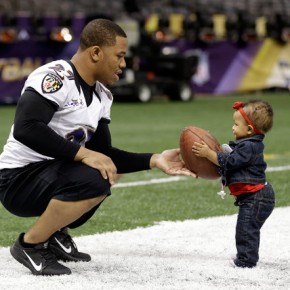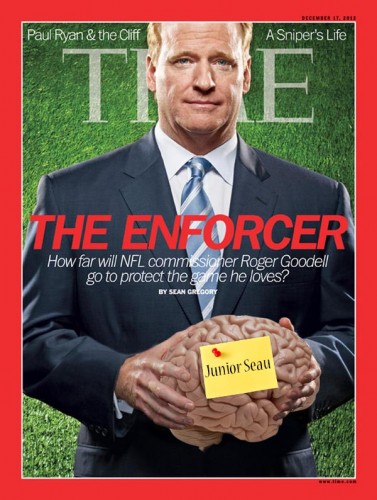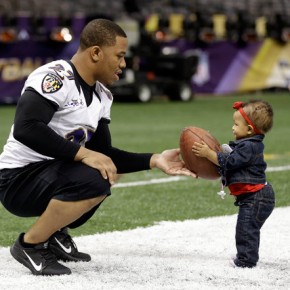
This Ray Rice saga doesn’t seem to be going anywhere and it just keeps getting more interesting. Just yesterday (Friday September 19th) ESPN’s Outside the Lines released a report of the long, detailed timeline of events from the original incident right up until Roger Goodell’s press conference yesterday. It’s a fascinating account of the NFL’s behind-the-scenes PR spin machine, complete with new revelations (Ravens’ coach John Harbaugh wanted to release Ray Rice back in the spring?) and some of the thought process behind the original 2 game suspension.
 It’s this last aspect of the story that I find to be most interesting. Roger Goodell has become known for his heavy-hand in dealing out suspensions to players under the NFL’s personal conduct policy and the originally short suspension for Rice came as a surprise to everyone (outside of Baltimore, that is). The comparatively short suspension was immediately criticized by pretty much everyone in the country for being far too lenient. While some defended the short suspension because it was unclear what exactly happened inside the elevator, the truth is that the league was willing to give Rice a pass because he was otherwise a model of goodwill and charity to the city of Baltimore. Shortly after the abuse, Harbaugh (most certainly reading lines given to him by the PR department) said, “There are a lot of question marks. But Ray’s character — you guys know his character — so you start with that.” By all accounts, this statement and others weren’t false. Rice had raised millions of dollars for sick children, was at the forefront of anti-bullying legislation, and hosted an annual football camp for disadvantaged kids.
It’s this last aspect of the story that I find to be most interesting. Roger Goodell has become known for his heavy-hand in dealing out suspensions to players under the NFL’s personal conduct policy and the originally short suspension for Rice came as a surprise to everyone (outside of Baltimore, that is). The comparatively short suspension was immediately criticized by pretty much everyone in the country for being far too lenient. While some defended the short suspension because it was unclear what exactly happened inside the elevator, the truth is that the league was willing to give Rice a pass because he was otherwise a model of goodwill and charity to the city of Baltimore. Shortly after the abuse, Harbaugh (most certainly reading lines given to him by the PR department) said, “There are a lot of question marks. But Ray’s character — you guys know his character — so you start with that.” By all accounts, this statement and others weren’t false. Rice had raised millions of dollars for sick children, was at the forefront of anti-bullying legislation, and hosted an annual football camp for disadvantaged kids.
So why did Rice originally get off so easy??? It seems that the long, shiny list of Rice’s good deeds were weighed against one terrible incident in an elevator. Rice was judged to be a “good guy” who had one dark night. As the article notes,
Goodell invited Ray and Janay to have a brief private chat with him in his office; during the conversation, the commissioner spoke about how Ray Rice could be a spokesman in the future against domestic violence, the sources said. Rice later told friends the commissioner spent the majority of the meeting discussing Rice’s reputation as a positive role model in the community.
The article indicates that Goodell handed out a lighter punishment because, though the crime demanded an indefinite suspension, Rice as a person only merited a two games.
 But everything changed once the elevator video was leaked and we all got to see what actually happened. Anyone who saw Rice’s flash of rage and his wife’s limb body quickly realized that no amount of charity work can cover over such an atrocious act of violence. Our culture has many irrevocable moral absolutes and punching a woman is most certainly one of them. After seeing the elevator video, it became impossible to suggest that Rice was a good guy who had a bad night. That single event has perhaps forever poisoned how he will be viewed by the public.
But everything changed once the elevator video was leaked and we all got to see what actually happened. Anyone who saw Rice’s flash of rage and his wife’s limb body quickly realized that no amount of charity work can cover over such an atrocious act of violence. Our culture has many irrevocable moral absolutes and punching a woman is most certainly one of them. After seeing the elevator video, it became impossible to suggest that Rice was a good guy who had a bad night. That single event has perhaps forever poisoned how he will be viewed by the public.
In many ways, this tragic situation and its aftermath exposes the folly of “he’s such a good guy” logic when judging the immorality of a given act. Who we are is inseparable from what we do, and our actions – whether good or bad – will forever stay with us. And while Rice’s offense is rightly deemed to be particularly egregious relative to other possible misdeeds, his situation demonstrates that no good deeds he has done can outweigh the bad. There isn’t a large enough check that Rice can write to alter the reality that he is a spouse abuser. In the ledger of one’s life between good and evil, our misdeeds are written down in a red Sharpie marker and the record of good deeds should not be confused with White Out. In short, there is nothing Rice can to do. Even a reformed criminal is still a criminal.
It’s been my experience that the only thing Ray Rice can hope for is forgiveness. The past and his own violence cannot be changed, nor can anything be done to make-up for what he did. Instead, perhaps the past can be robbed of its continued power on the present through an intervention of mercy. To forgive Ray Rice is to treat him as though he were innocent of all wrongdoing – as if it never happened in the first place. Time will tell how the rest of the saga will play out, but Rice (or us for that matter) will likely never receive such absolution from the court of public opinion. But if Christ came into the world to save sinners, then he came for Ray Rice as well.

COMMENTS
Leave a Reply












